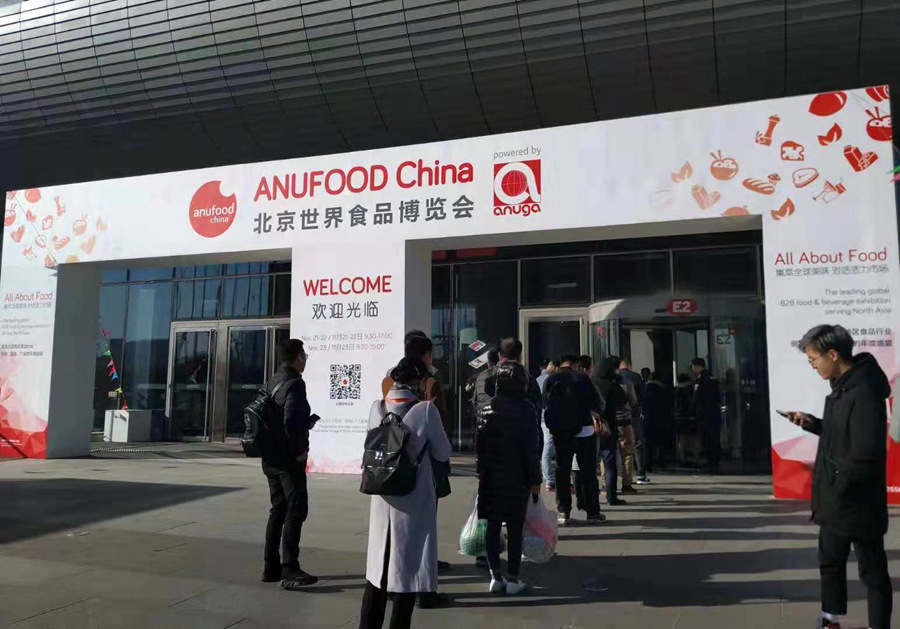


Visitors line up for the ANUFOOD event in Beijing (Photo/Morag Hobbs)
International sellers were out in force at this year’s ANUFOOD China, held from Nov. 21 to 23 at the China National Convention Center in Beijing, with many sellers commenting that China is the next big market for the organic and health food industry.
The event brought sellers from countries all over the world such as Germany, Australia and South Korea to Beijing to sell goods including meat, dairy, fruit, oils and organic products. Many stalls enticed buyers with natural oils, nuts, smoothies and tea, hoping to stake out a share in the burgeoning health-food industry.
Earlier this year, Global Times reported that China had become the world's fourth-largest organic food consumer, according to industry statistics. However, organic food as a percentage of the nation's entire food market only stands at about 1.5 percent, indicating great untapped opportunities. It’s this gap in the market that many health food companies at ANUFOOD were determined to fill.
Majid Rooygar Haghroo, from Rahmani Group, a food unit which produces and sells a variety of healthy foods such as nuts, herbal teas and organic honey is one of them, and he explains that he is optimistic about selling his products in China, despite the fact that the country is already a production powerhouse. “In China, you can find everything; they have honey, they have nuts, and are, of course, famous for herbal tea. However, the feedback has been very good, we found customers and clients that are eager to work with us, and we are now very optimistic about our business opportunities in China.”

A number of stalls displayed organic products, like this Italian brand Ladolea (Photo/Morag Hobbs)
Market surveys show that Chinese consumers are already spending more on fine foods, and are increasingly willing to pay more for organic. Sahin Guzel, from Oya, a German company which produces organic smoothies, said that the reaction to his smoothies had been positive during the ANUFOOD event, but the country is only just starting out when it comes to its health food industry. “China is at the beginning. In Germany, it started with the fitness trend - supplements, weight protein and so on, and now it’s changed to natural, healthy living and finding the correct balance of nutrients your body needs. In the future, it will become a huge market here, too.”
Haghroo agrees that in general, people around the world are following a similar trend. “If you look at healthy food, the trend is going up; people are looking for pleasure combined with healthy foods, which you can find in our products.”
Rahmani Group is one of many international companies that are combining healthy, organic foods with Chinese marketing methods to make the transition into China easier. “We have a jar of honey which has a QR code, if you scan the QR code it will show you the identification and specification of the honey, to prove the originality.”
It isn’t just international sellers that are breaking into the organic Chinese market, either. Yao Huifeng, from Yifeng county, Jiangxi Province now sells organic rice for 10 yuan ($1.45) per kilogram, three times higher than the average price. Despite this, his rice business is going from strength to strength. Last year, his success drew more than 70 local farmers to join his rice cooperative. "Ninety percent of the local fields have switched to organic rice, and the economic output in our cooperative has exceeded four million yuan," Yao said in an interview with China Daily.
It seems that as the middle class in China grows, so does its expectation for quality, fine foods which are healthy and organic. “China is a very big market, if we can penetrate just one percent of that market, that would be enough,” adds Haghroo.

 Award-winning photos show poverty reduction achievements in NE China's Jilin province
Award-winning photos show poverty reduction achievements in NE China's Jilin province People dance to greet advent of New Year in Ameiqituo Town, Guizhou
People dance to greet advent of New Year in Ameiqituo Town, Guizhou Fire brigade in Shanghai holds group wedding
Fire brigade in Shanghai holds group wedding Tourists enjoy ice sculptures in Datan Town, north China
Tourists enjoy ice sculptures in Datan Town, north China Sunset scenery of Dayan Pagoda in Xi'an
Sunset scenery of Dayan Pagoda in Xi'an Tourists have fun at scenic spot in Nanlong Town, NW China
Tourists have fun at scenic spot in Nanlong Town, NW China Harbin attracts tourists by making best use of ice in winter
Harbin attracts tourists by making best use of ice in winter In pics: FIS Alpine Ski Women's World Cup Slalom
In pics: FIS Alpine Ski Women's World Cup Slalom Black-necked cranes rest at reservoir in Lhunzhub County, Lhasa
Black-necked cranes rest at reservoir in Lhunzhub County, Lhasa China's FAST telescope will be available to foreign scientists in April
China's FAST telescope will be available to foreign scientists in April